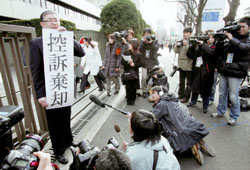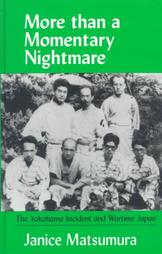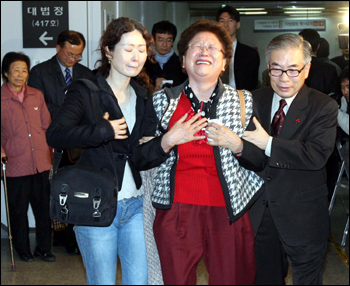By Gavan McCormack, Kamiya Setsuko, and Yonhap News
The maturity and the humanity of states and societies, as in the case of individuals, may be measured by the way they face the darkest moments of their own history. The contrast between recent judgments in courts in South Korea and Japan points to a gulf in terms of civic maturity, with South Korea apparently showing the way to Japan.
The articles below report important cases from the two countries. In Japan, the Tokyo High Court has just rejected appeals from the families of five men (journalists, editors, etc) convicted in 1945, after torture, under the provisions of the wartime Public Peace Law for “aiding communism.” As noted in an earlier Japan Focus article on this case, “No Japanese court has ever adequately addressed the criminality of any action by the prewar or wartime state, including its armed forces. Courts have been, and continue to be, deeply reluctant to consider any possible claim of state criminality” (Nishimura Hideki, “The Retrial of the ‘Yokohama Incident’”.
In South Korea, however, almost simultaneously with the Japanese judgment, a Seoul court acquitted of treason eight men who in 1975 had been found guilty and executed during the Park Chung-hee dictatorship under the National Security Law (itself modeled on the wartime, militarist Japanese law).
The difference in the two countries may be attributed above all to one factor: in Japan, postwar governments have always stressed continuity with their wartime predecessors, and powerful currents in state and society therefore resist any notion of criminal responsibility by the wartime regime, while in Korea the democratic revolution of 1987 marks a clear caesura in the state; the 6th Republic today is quite different in character from the military regimes that preceded it, especially the 3rd (1963-72), 4th (1972-9) and 5th (1979-87).
In Japan, Current Prime Minister, Abe Shinzo, only agreed under heavy parliamentary pressure late in 2006 to accept as government policy Japan’s official war apologies issued a decade earlier, which he had till then strongly opposed. However, he clearly did not like or agree with them. The repetition, by Abe and other senior Japanese government figures, of formulaic, stilted, apologies, and the absence of any meaningful government reparations program for victims of atrocities and forced labor, is therefore often seen in neighboring countries as insincere, or even as part of an attempt to evade responsibility.
Some Japanese courts, however, have been more forward-looking. Only weeks ago, the families of soldiers accused of engaging in a “one hundred head chopping” contest during the Nanjing fighting of late 1937, lost a case for defamation against several authors and editors for their studies of the atrocity. In dismissing the suit, the judge commented that the acts were beyond dispute. On the Yokohama case, however, after more than six decades the struggle to clear the names of innocent Japanese victims of Japanese militarism continues. The case will most likely now go to the High Court. Other cases – notably those of military sex slaves and of Chinese and Korean forced laborers, likewise continue their tortured path through the Japanese courts. Judicial vacillation reflects the failure to achieve a social consensus on the meaning of the crucial 20th century experience.
In South Korea the repression and brutality is more recent. The government of Park Chung-hee (1961-1979) successfully launched the country on its industrialization path but was also ferociously repressive, regularly using trumped up charges of “aiding the north,” or “pro-communism” to crush any attempt at democratic opposition. The dictatorship, supported by the United States and Japan, was only overthrown in 1987 by dint of student and citizen-led mass protest, at heavy cost. Since then, despite vicissitudes, civil society has slowly matured, to the point that leaders of the 1980s democracy movement now stand at the helm of the state.
In acquitting the eight victims of the 1975 case, the Seoul court, in effect, returned a finding of judicial murder against the state. In doing so, it was acting under a 2005 “Basic Law for Truth and Reconciliation” whose focus was both the collaborationist (with Japan) prewar and wartime era and South Korea’s 1945-1987 post-colonial military dictatorships. Judicial review of judgments especially under the 1972 South Korean “Yushin” regime (and associated “Emergency” decrees) continues, and further judgments in the same vein as the current one are expected.
Other cases are expected to be opened shortly, including that of the 1961 execution of Cho Yong-su, President of the Minjok Ilbo newspaper, for violating the National Security Law.

Senior officials of the Minjok Ilbo in court, 1961
As international attention focuses on North Korean breaches of human rights and abductions of Japanese citizens, it is often forgotten that South Korea too, till recently, was responsible for abductions on a grand scale – most notoriously of students and artists from Europe in 1967 to torture and in some cases execute on trumped up charges, and of opposition politician Kim Dae Jung from Tokyo in 1973. Kim, who barely survived a regime bent on his execution, subsequently became president, Nobel laureate, and South Korea’s most revered contemporary figure.
However, the situation in South Korea remains complex. A “threat from the north” did exist in the 1960s and 1970s and continues to exist. What the Korean courts are saying is that such threat cannot justify state crimes and breaches of human rights. The courts will have to probe the knottiest problems of where to draw lines as they grapple with other, recent cases. While one court has posthumously vindicated the defendants in the case reported below of spying for North Korea charges, another is preparing to hear proceedings in a trial of five people, including a senior official of a parliamentary group (Democratic Labor Party) holding ten seats in the National Assembly, on similar charges of spying for North Korea under the same, still unrescinded, peace preservation law.
(GMcC)
See also Kajimura Hideki, “Democracy and National Security in South Korea: The Song Du-yol affair.”
‘Yokohama Incident’ Appeals Dismissed: Relatives to turn to Supreme Court to clear men’s names
By Kamiya Setsuko
The Tokyo High Court on Friday dismissed appeals brought by the relatives of five men convicted in the so-called Yokohama Incident, the nation’s worst case of repression of journalistic freedom during the war.

A supporter of defendants shows a banner saying
that the appeal has been rejected. (Kyodo News)
The high court supported a lower court decision that the case had to be terminated because the five men had been given a general amnesty after the war and the anticommunist law under which they were charged had been abolished.
The relatives of the five, who are all deceased, were seeking a retrial to clear their names. They claim the five were wrongfully charged because they were tortured into confessing.
After being rejected by the lower court, they appealed to the high court, believing the lower court’s decision was undermining their attempt to win redemption for those wrongfully convicted.
Immediately after the ruling Friday, lawyers for the group appealed to the Supreme Court, stating that the high court’s decision violates the Constitution, which gives people the right to a fair trial.
Maki Kimura, fighting on behalf of her husband, Toru, who was an editor at Chuo Koron magazine before he was convicted, said she was determined to fight to the end.
“I’m not here to seek mercy (for my husband), but I’m doing this for the justice system to apologize for the mistake it has made,” Kimura, 57, said. “We’re going to fight this all the way to prove that we are right.”
In his decision, presiding Judge Fumihiro Abe said that termination of the case has freed the accused from criminal procedures, and that they were no longer subject to any punishment. Therefore, seeking a retrial to win acquittals would not benefit the defendants, the judge said.
Relatives and lawyers of the defendants disagreed.
“The judge’s voice was so small that I could hardly hear sometimes, but if he knew he was right, he would have read out loud for everyone to hear,” Kimura said.
Toru Kimura and the four other men named in the retrial — Toshio Hiradate, Kenjiro Takagi, Eizaburo Kobayashi and Hiroshi Yoshida — were convicted in August and September 1945 of promoting communism in violation of the Peace Preservation Law, which was abolished after the war.

Defendants in the Yokohama Incident trial
Their case was part of the Yokohama Incident, in which about 60 people, including journalists and editors, were arrested and convicted for similar charges. After the war, “special police” officials who investigated them were convicted for assault and bodily injury caused by torture.
The five men had been demanding a retrial since 1986, claiming they were wrongfully charged after investigators tortured them to get confessions. Although the five are dead, their relatives continue to petition for retrial.
Their 1998 petition prompted the Yokohama District Court to reopen the case in April 2003. The decision was upheld by the Tokyo High Court in March 2005.
However, the district court terminated the trial in February 2006 and did not rule on their guilt or innocence. The appeal trial in Tokyo opened in November 2005, but evidence presented in the lower court was not reinvestigated.
Kamiya Setsuko is a staff writer for The Japan Times.
This article appeared in The Japan Times on Jan. 20, 2007.
Court clears victims executed for treason in 1975
By Yonhap News
A Seoul court on Tuesday acquitted eight South Koreans of treason, more than three decades after they were executed by hanging on conviction of trying to organize a subversive pro-North Korean body.
The Seoul Central District Court said the defendants were not guilty of forming an underground pro-communist group with the aim to overthrow the then authoritarian South Korean government of President Park Chung-hee.
The eight were among 23 college students and civic activists arrested on charges of violating South Korea’s strict anti-Communist National Security Law amid a ruthless government crackdown on dissent.
The eight, including a Japanese language teacher and a construction company official, were executed in April, 1975, only 20 hours after the Supreme Court found them guilty of trying to rebuild what state prosecutors said was a disbanded pro-communist group called “inheyokdang,” or “People’s Revolutionary Party.”
In December 2005, a Seoul court ordered a retrial of the case after a presidential advisory group concluded that the victims were tortured into making false confessions.
“The court found no evidence to prove the prosecution’s claim that the accused had engaged in organized activities to overthrow the government at that time,” presiding judge Moon Yong-sun said in issuing the acquittal.
The judge said the prosecution’s investigation records “written when the accused were not free” also cannot be adopted as evidence.
Some bereaved family members of the victims cried when the “not guilty” verdict was read.

Kang Soon-hee, center, wife of pro-democracy activist Woo Hong-son,
who was hanged together with seven others, in tears following the verdict.
“I’m extremely happy because today’s ruling lessened my suffering,” said Lee Yeong-gyo, wife of late Ha Jae-wan, one of those executed. “It grieves me a lot when I think of my husband who is in heaven without knowing that he was found not guilty.”
The defense lawyers and civic groups welcomed the new court ruling.
“Truth will win out in the long run,” the groups said in a joint statement issued after the re-trial. “We welcome the decision which has judicially restored the victims’ honor.”
Relatives and friends had demanded a retrial for years, claiming that the case was fabricated by the then state intelligence agency that backed Park’s dictatorship.
They also cited an internal probe by the National Intelligence Service (NIS), in which it admitted that its predecessor, the Korean Central Intelligence Agency (KCIA), had manipulated two cases involving Inhyeokdang.
Among other things, they cited that the KCIA arrested what it called key members of the party in 1964, labelling them as pro-Communists linked with North Korea. However, it released them shortly afterwards under strong protests from their families.
In its 2005 report, the NIS concluded that the so-called “party” was nothing but a student circle interested in pro-democracy movements and that a “committee for reconstructing the party” allegedly organized by the eight victims was non-existent.
This Yonhap News article was published on Jan 23, 2007.
This sequence of stories was published at Japan Focus on Jan. 29, 2007.


